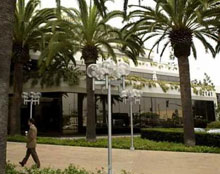|
CNOOC to decide on Unocal bid this week
(Agencies)
Updated: 2005-06-22 08:49
SINGAPORE - China's state-run energy firm CNOOC is getting heaps of
advice from financial markets, its rival and U.S. politicians -- all urging it
not to challenge Chevron's $16 billion bid for Unocal.

The offices of
Unocal Corporation at 2141 Rosecrans Avenue in El Segundo, California near
Los Angeles pictured June 18, 2003. Two U.S. congressmen have asked the
Bush administration to review and possibly block any effort by China's
CNOOC to acquire Unocal Corp. The move comes amid reports that CNOOC,
China's third largest oil group, was set to announce a counter-offer to
trump California-based Chevron Corp's $16-billion bid for Unocal.
[Reuters] | But with a board meeting scheduled this week, it's still not clear whether
directors of the third-largest Chinese oil and gas producer will support a bid,
a source close to the process told Reuters on Tuesday.
"A decision will be made this week, but definitely not today," said the
source, who asked not to be identified. According to media reports, CNOOC is
poised to lodge a counter-bid because a valuation report on U.S. producer Unocal
by CNOOC's independent advisers, including investment bank Rothschild, could
favor such a move.
If the deal goes through, it would be the biggest ever overseas acquisition
by a Chinese firm.
Most watchers say a counter-bid would harm CNOOC because of high costs and
political obstacles it faces in the United States. Investors have already been
penalising CNOOC by dumping its shares. It used to be an investor favorite
because of its high-growth prospect and low-cost structure.
Research reports from several investment banks this month say a counter-bid
may be a disaster to CNOOC as it would dampen its earnings prospect or lead to a
mountain of debt at the firm.
Meanwhile, California-based Chevron is going all-out to prevent it from
buying Unocal in its home turf. Chevron certainly has stronger financial muscle
to win a bidding war.
The political climate is also stacking up against CNOOC. Two California-based
lawmakers have urged the Bush administration to review and possibly block any
bid by CNOOC.
By contrast, U.S. antitrust authorities quickly approved Chevron's planned
purchase of Unocal, just two months after the deal was announced.
Chevron won a race against several oil companies, including CNOOC, to sign an
agreement in April to buy Unocal, which has an enviable portfolio of oil and gas
assets in Asia.
It is becoming increasingly difficult for CNOOC and Chevron to find unclaimed
reserves.
CNOOC, with over $1 billion in overseas investment, aspires to become a major
regional liquefied natural gas producer. It made a last-minute decision not to
bid for Unocal in the face of opposition from some independent board directors.
CNOOC's original planned offer was more attractive than Chevron's $16.4
billion bid -- structured as 75 percent in Chevron stock and the rest in cash --
plus assumption of $1.6 billion in debt.
Despite Chevron's winning bid, CNOOC said as recently as this month it was
still considering a counter-offer.
Industry sources say CNOOC's new management led by chairman Fu Chengyu is
eager to make their marks and to boost the domestic ranks of CNOOC, now a
distant number three after PetroChina and Sinopec
Although it has kept its options open, analysts say a rival-bid is unlikely
given the $500 million break-up fee CNOOC needs to pay Chevron on top of a
sweetened price tag needed to trump Chevron's deal.
CNOOC may need to pay nearly $20 billion to lure Unocal shareholders, which
-- barring further increases in oil prices for a few more years -- would
undermine CNOOC, analysts say.
"I have a 50:50 view on oil prices. If they keep increasing, CNOOC's bid
should be a smart one," said Clive Zhang, chief investment officer at Partners
Capital Asset Management, which does not hold CNOOC shares.
If CNOOC was to make an all-cash bid, its debt ratio would skyrocket to over
200 percent from a positive net cash position, says Lawrence Lau at
Beijing-backed brokerage BOCI. Standard & Poor's says a bid would weaken
CNOOC's credit profile.
CNOOC could issue new shares to help finance the purchase, but that may not
be accepted by Unocal, which would favor Chevron's stock, analysts say.
CNOOC, in which the Chinese government ultimately holds a more than 70
percent stake, could ignore any short-term commercial risks from a bid by
declaring the deal a top national interest to secure energy resources.
"This is a good test for CNOOC and also other Chinese companies making
overseas acquisitions. Will they give priority to minority shareholders'
interest?" asked Gideon Lo, an analyst at DBS Vickers Securities.
What is unknown is whether CNOOC's parent firm would lead the bid for Unocal
with an aim to on-sell Unocal's Asian portfolio to CNOOC, while finding a buyer
later for unwanted Unocal assets in North America, according to a Merrill Lynch
report.
BOCI's Lau and Deutsche Bank say CNOOC may just want to use a hostile bid to
cut a better deal with Chevron for a stake in Australia's $8.3 billion Gorgon
gas field -- a Chevron-operated project targeting China as a key market.
"The question then becomes whether the Chinese are gaming Chevron into making
concessions... CNOOC could gain even further leverage by threatening to go
hostile on Unocal," said Deutsche Bank analysts Paul Sankey and Jay Saunders in
a June report.
|